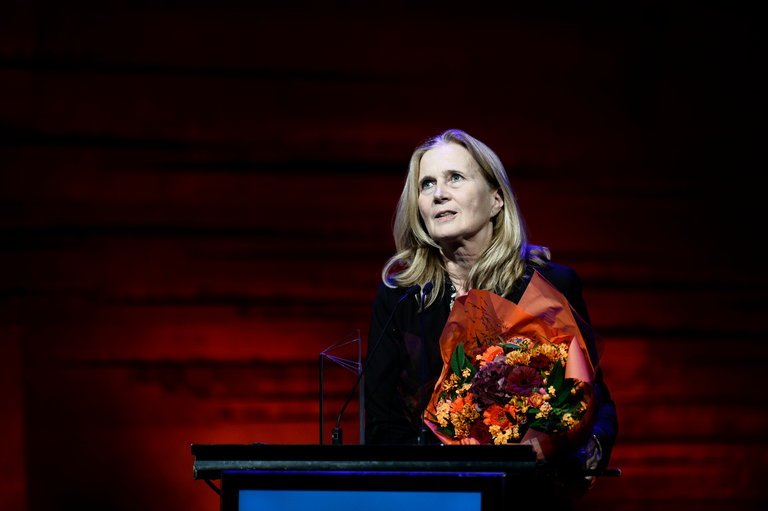Sex Abuse Scandal Casts Shadow over Nobel Prize for Literature
By Christina Anderson
A sexual abuse and harassment scandal roiling the committee that awards the Nobel Prize in Literature deepened on Wednesday, as the king of Sweden and the foundation that finances the prize warned that the scandal risked tarnishing one of the world’s most important cultural accolades. A schism in the Swedish Academy, which has awarded the prize since 1901, erupted into the open last week, the culmination of a scandal that stretches back to November, when the newspaper Dagens Nyheter reported that 18 women had accused Jean-Claude Arnault, a major cultural figure with close ties to the academy, of sexual assault and harassment. Mr. Arnault is married to the poet Katarina Frostenson, a member of the academy, and together they run a private cultural club, called the Forum, that has received money from the academy. The newspaper reported that Mr. Arnault had mistreated women at the club and at academy-owned properties in Stockholm and Paris over a 20-year period. It also reported that Mr. Arnault had leaked information about the prize committee’s confidential deliberations seven times since 1996. The Swedish police have opened an investigation, although the authorities have warned that some allegations are too old to act on. The academy has severed all ties with Mr. Arnault and with the club, and hired a law firm to review its past links to him. Mr. Arnault denies the accusations, and Ms. Frostenson has refused to step down from the academy, despite calls for her to do so. In a recent closed-door vote, eight members voted to keep her on the board and six voted to oust her. (Ms. Frostenson did not vote.) Three of the members who voted to oust her — Klas Ostergren, Kjell Espmark and Peter Englund — then announced that they would no longer work with the academy. A fourth member, Sara Stridsberg, has also threatened to leave. There is no formal provision for members to resign from the board and be replaced. Even before last week, two of the academy’s 18 members long ago stopped taking part and have not been replaced: One left in 1989 as part of a protest over the academy’s response to threats made against the writer Salman Rushdie, and another stopped taking part in 2015, saying that she did not feel she fit in.
“Confidence in the Swedish Academy has been severely damaged,” the Nobel Foundation, which manages the financing and administration of the Nobel Prizes, said on Wednesday in an extraordinary public rebuke. “It is not yet possible to say how this will damage the Nobel Prize.” The foundation said that the academy needed to ensure the confidentiality of the prize deliberations; that the process for this year’s literature prize must be “executed in a trustworthy fashion”; and that suspected crimes should be “referred to and handled by the justice system.” “It takes a long time to repair damaged confidence,” the foundation added. “The Swedish Academy’s members must now put their mission before their individual interests to restore faith in the Academy’s important work with the Nobel Prize in Literature.” King Carl XVI Gustaf also weighed in, saying in a statement: “The conflicts which have arisen within the Swedish Academy are deeply unfortunate and risk seriously damaging the Academy’s important functions.” The academy, founded in 1786 by King Gustav III, has 18 members who are elected for life terms. The current king said he might have to invoke his monarchical authority to alter the academy’s rules to provide for the replacement of members who leave the board. Worsening the scandal, new evidence has emerged showing that as early as 1996, a textile artist, Anna-Karin Bylund, complained to the academy’s top administrator at the time, Sture Allen, about sexual harassment by Mr. Arnault. Mr. Allen, who remains a member of the academy, has said he did not act on the letter because “the contents of the letter didn’t seem important.” On Wednesday, Ms. Bylund told Dagens Nyheter that Mr. Arnault had sexually assaulted her in the early 1990s. His lawyer, Bjorn Hurtig, did not immediately respond to a request for comment. The controversy has exposed deep rifts within the academy. One member, Horace Engdahl, an admirer of Mr. Arnault, has called his three colleagues who left “a clique of sore losers” who should not have aired the internal disagreement in the public. “These sorts of indiscretions are more damaging to the academy than a Nobel Prize decision that has leaked out a few days too soon,” he said. Mr. Engdahl has also criticized the academy’s administrator, Sara Danius, the first woman to occupy that post. Ms. Danius, whom supporters describe as a force for reform and modernization, was behind the decision to hire the law firm. She has said little in public since the controversy erupted. As Mr. Engdahl’s comments rippled through the Swedish press this week, his ex-wife, Ebba Witt-Brattstrom, also rose to criticize him. She called the academy “incredibly patriarchal” and said that Ms. Danius was being bullied for being an outspoken woman.
|
.
Any original material on these pages is copyright © BishopAccountability.org 2004. Reproduce freely with attribution.

